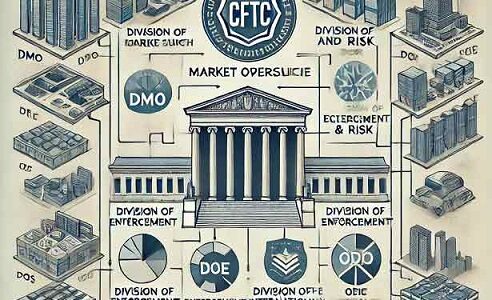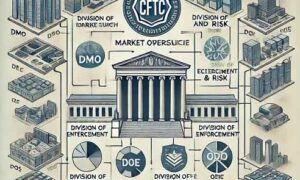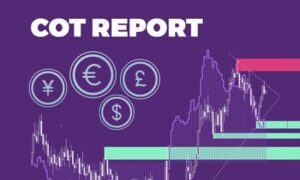The CFTC stands for the Commodity Futures Trading Commission, an independent agency of the United States government. Its primary role is to regulate the U.S. derivatives markets, which include futures, swaps, and certain kinds of options.
(Commodity Futures Trading Commission)
What is the Commodity Futures Trading Commission, or CFTC?
The CFTC comprises five commissioners appointed by the President and confirmed by the Senate. The commissioners serve five-year terms. The President designates one of the commissioners as chair, and no more than three commissioners on each commission may be from the same political party at any time.
The CFTC has issued several warnings about cryptocurrencies. According to the CFTC website: “Several studies and news reports indicate that a large number of initial coin offerings (ICOs) are fraudulent or do not deliver on their promises.” The commission has given fraud estimates ranging from 5% to over 80% of ICOs.
![]()
The CFTC is one of the most respected regulators in the world, operating in conjunction with the Commodity Futures Trading Commission. It is ranked number one in the world. The mission of the Commodity Futures Trading Commission (CFTC) is to promote the integrity, flexibility, and vitality of the U.S. markets by providing sound regulation.
Category | Details |
Founded | 1974 |
Jurisdiction | United States |
Purpose | Regulates derivatives markets (futures, swaps, options) |
Key Responsibilities | Market integrity, systemic risk management, fraud prevention, transparency |
Key Regulations/Acts | Commodity Exchange Act (CEA), Dodd-Frank Act, Position Limits Rule |
Regulated Markets | Futures, swaps, commodity options |
Market Participants | FCMs, Swap Dealers, DCOs, DCMs, SEFs |
Organizational Structure | DMO, DCR, DOE, DSIO, OCE, OIA, ODT |
Public Reports | Commitments of Traders (COT), Bank Participation, Monthly Data, Large Trader |
Enforcement Actions | Fraud, market manipulation, recordkeeping violations, compliance actions |
CFTC vs. SEC | CFTC: Futures/commodities; SEC: Stocks/securities |
CFTC Divisions
The CFTC is comprised of the Chairman’s and Commissioners’ offices, as well as 13 divisions and agency offices. Let’s review the five main divisions of the CFTC: the Clearing and Risk Division, the Market Participants Division, the Market Surveillance Division, the Data Division, and the Enforcement Division.
- Division of Clearing and Risk (DCR) The Division of Clearing and Risk (DCR) enables the CFTC to fulfill its statutory responsibility to ensure the economic integrity of all transactions subject to the Commodity Exchange Act (CEA) and avoid systemic risk in the derivatives markets.
- Market Participants Division (MPD) The Market Participants Division (MPD), formed in October 2020, results from a merger between the Swap Dealer and Broker Supervision Division and the Office of Client Education and Development. The MPD’s primary responsibilities are to oversee CFTC registrants who trade, transact, invest, and advise in the derivatives markets and to educate the American public about the derivatives markets that the CFTC regulates.
- Division of Market Supervision (DMO)The Division of Market Supervision (DMO) oversees the stability and structure of derivatives markets regulated by the CFTC, as well as the exchanges and brokers on which these derivatives are traded. One of the DMO's primary functions is to develop and enforce CFTC regulations to promote fair, efficient, and vibrant derivatives markets and ensure that these regulations address the latest developments in the industry.
- Division of Enforcement (DOE)As its name suggests, the Division of Enforcement (DOE) is responsible for detecting, investigating, and prosecuting Commodity Exchange Act (CEA) and CFTC regulations violations.
What does the CFTC regulate?
The CFTC regulates the U.S. derivatives markets. This includes the commodity futures, options, swaps markets, and over-the-counter (OTC) markets. To adequately oversee these markets, the CFTC regulates the following organizations: trading organizations, such as designated contract exchanges, which are exchanges that host futures trades, and swap execution facilities, which are platforms that allow participants to buy and sell swaps.
The CFTC’s Clearing and Risk Division oversees derivatives clearing organizations (DCOs), such as Options Clearing Corporations. The OCC is the largest DCO in the world and operates under the jurisdiction of the CFTC. The Exchange Database, created by the Dodd-Frank Act to provide a central facility for exchange data reporting and recordkeeping, is also regulated by the CFTC.
Frequently Asked Questions
The Commission is an independent federal agency regulating derivatives markets in the United States, including futures, options, and swaps.
The CFTC regulates the U.S. derivatives markets. This includes commodity futures, options, swaps markets, and over-the-counter (OTC) markets.
OUR BLOG
Check our other top quality content posts on the blog.



